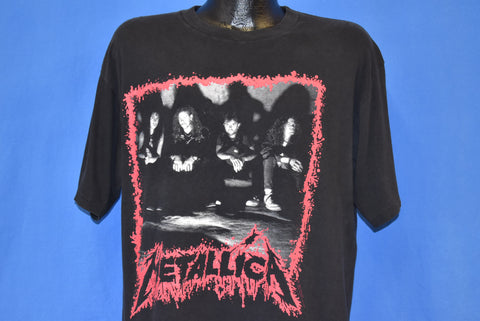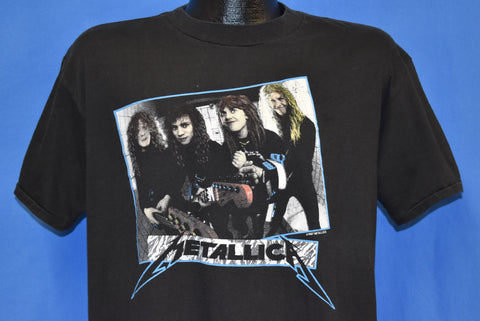On April 13th, 2000 the historic lawsuit that nearly upended the music industry was filed-- Metallica v. Napster, catalyzing a revolutionary era of music streaming.
Metallica, the legendary thrash metal band are considered one of the most commercially successful bands of all time, with a mega fan base in the rock and heavy metal community. James Hetfield and Lars Ulrich first formed Metallica in Los Angeles ‘81. Their logo has become a brand of its own, designed by Hetfeld himself.
The lineup today consists of James Hetfield, Lars Ulrich, Kirk Hammett, Robert Trujillo, Metallica were widely regarded as one of “Big four” of trash metal bands, along with Anthrax, Slayer, and Megadeath. Their '86 album Master of Puppets has been regarded as the most influential thrash metal album of all time.
Two years later, Metallica and Justice for All went platinum, the first time an underground metal group reached a chart position on U.S. Billboard, and sold more than 8 million copies in the U.S. alone. Metallica began the 1990s with their eponymous fifth album which accrued further mainstream praise. With 9 Grammy awards, they had become one of most commercially successful bands of all time.
Later in the 1990s at Northeastern University, 19-year-old Shawn Fanning and Sean Parker collaborated to create the peer-to-peer MP3 file sharing app called Napster. Created in ‘99, Fanning has said the original intent of the app was for social purposes, a platform where people can search for files, chat with another, and build social circles around different bands and genres.

Fanning and Parker
Napster's popularity arose alongside the expansion of high-speed internet on college campuses. It was the perfect platform to search and download MP3s for young people on the internet, and it didn’t take long for thousands of people to start joining and swapping music files on what became the celestial jukebox.

Within a year of its launch, Napster had tens of millions of users. This success made Napster one of the fastest-growing businesses of all time. Consequently, this mean that these tens of millions of users would no longer be paying for music.
A version of the song “I Disappear,” recorded by Metallica for the Mission: Impossible 2 soundtrack was leaked in advance on Napster, catalyzing the historic lawsuit. The leak was also broadcast on radio before its official release. Metallica and the Recording Industry Association of America (RIAA) responded by filing suit against Napster. The RIAA claimed that Napster violated copyright infringement, unlawful use of digital audio interface device, and the Racketeer Influenced and Corrupt Organizations Act (RICO)
Lars Ulrich was the outspoken advocate for artists facing free internet distribution of their music. At the 2000 MTV Video Music Award’s, Ulrich and host Marlon Wayans performed a skit reenactment of Fanning. Later in the night, Fanning came on stage wearing a Metallica t-shirt, “I borrowed this from a friend. Maybe, if I like it, I’ll buy one of my own.”
With a global audience following the proceedings, the narrative was clear: Metallica and the RIAA were going up against millions of college students who had fallen in love with Napster. It was the baby-face nerdy Fanning versus Ulrich, a millionaire metalhead. The lawsuit was perceived as an attack by Metallica on their dedicated fan base.

Dr. Dre was another artist who was anti-Napster, filing a separate suit which received considerably less attention. Other bands came out in support of the app, including Public Enemy’s Chuck D, Limp Bizkit, and the Offspring.
As college students were the target audience for Napster, universities became implicated were faced with a decision. Both Yale and Indiana University blocked access to the service, while others like Harvard, MIT, and Duke refused to restrict the service to its student body.
Napster lost the case, unsurprisingly, and soon after went bankrupt and was absorbed into Rhapsody. Metallica went from being counterculture outsiders to boardroom power players, seen as greedy sellouts who chose to make music for the money rather than for the art and the people. The damages sought in the lawsuit were $100,000 per copyright infringement which was an outlandish request of the 20-year-old.
The animated short,“Metalligreed,” was made by by Bob Cesca for Motley Crue. The anti-Metallica cartoon emphasized Motley Crue's stance in the matter, siding with Fanning and the fans, accusing Metallica’s pursuit as a publicity stunt “just to promote their tour.”
The media circus surrounding the case sparked a larger ongoing media versus internet debate. Battles between Sony and Apple, YouTube and Viacom, and television services on the internet originated from Metallica v. Napster. Despite Metallica’s reputation as one of the biggest rock bands in the world, this became a defining moment of their career.

After the case was settled, Napster was supposed to shut down temporarily to tweak copyright-catching filters, but the music app never returned. While pirating music is still common practice on the internet, it’s nowhere on the scale that Napster allowed it to be. In 2014, Ulrich claimed the case wasn’t about the money, but the choice to stream their music for free that was taken away from them.
For many, the lawsuit irreparably altered the image of Metallica, and the music industry as a whole. These days there are an abundance of music-sharing platforms, none of which are completely free. Napster is now widely recognized as a precursor to the many streaming platforms available today such as iTunes, Spotify, and Soundcloud.
In 2009, Sean Parker heard of the Swedish Company Spotify and its music streaming service, and was instrumental in bringing that service to the United States, bringing his vision with Napster full circle. And finally in 2012, Metallica made their first 9 studio albums available for streaming on Spotify.
Make sure you check out our awesome collection of authentic Metallica vintage t-shirts on our website!





